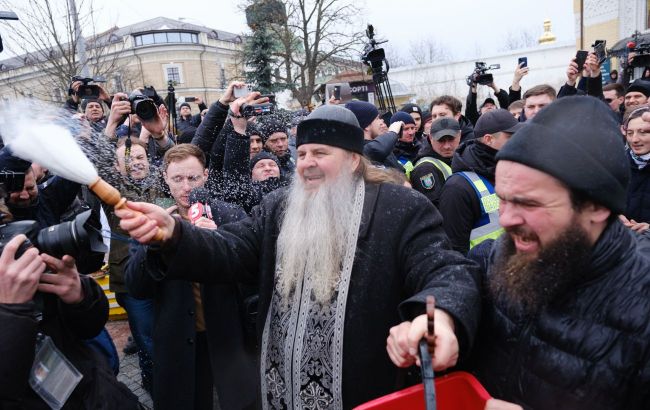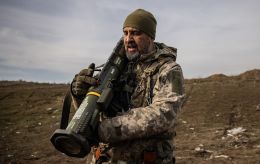Ukrainian churches to be inspected for Russian propaganda
 Photo: Moscow priests in the Kyiv-Pechersk Lavra (Vitalii Nosach, RBC-Ukraine)
Photo: Moscow priests in the Kyiv-Pechersk Lavra (Vitalii Nosach, RBC-Ukraine)
The Cabinet of Ministers of Ukraine has defined the signs of propaganda of the "Russian world." Grounds have emerged to inspect the Ukrainian Orthodox Church of the Moscow Patriarchate, according to Resolution No. 541 dated May 9, 2025.
The resolution approves the "Procedure for reviewing instances of 'Russian world’ propaganda through religious organizations."
According to the document, propaganda of the "Russian world" is defined as the spread of a corresponding ideology that contradicts Ukraine’s national security.
The review is initiated either by the State Service of Ukraine for Ethnic Policy and Freedom of Conscience or based on appeals from authorities, citizens, or organizations.
If signs of propaganda are identified, the State Service issues an order to create a group to review the matter. This group includes its employees and, if necessary, representatives of other state agencies and academic institutions.
The group considers data from public registries, media, expert reviews, open sources, and information received from authorities or the public. If needed, a religious studies examination is conducted, which must not exceed 30 days.
If repeated cases of propaganda are recorded, the State Service of Ukraine for Ethnic Policy and Freedom issues a corresponding conclusion by official order. The order with findings is published on the website of the State Service and sent to the religious organization within three days.
Signs of 'Russian world' propaganda
- Justifying the need to restore a Eurasian imperial space under the leadership of Russia, in which there is no place for an independent Ukraine.
- Presenting the so-called special military operation (Russia's invasion of Ukraine - ed.) as a "holy war," a confrontation with a godless and immoral West.
- Justifying territorial claims and Russian military aggression, undermining the sovereignty and territorial integrity of Ukraine by referencing shared history, religious traditions, linguistic similarities, and historical memory
- Denying the existence of the Ukrainian nation, Ukrainian statehood, or Ukraine's right to sovereign independence through the use of ideas like "triune Rus" or the unity of the Russian people”.
- Justifying the expansion of the Moscow Patriarchate in Ukraine through arguments about the uniqueness of the Russian historical path, Russian spirituality, special sanctity, "universality" of Russian Orthodoxy, and the eternal struggle between Russia and the West.
- Justifying the suppression of church life in Ukraine and its national-historical religious traditions.
- Denying the right of Ukrainian churches to autocephaly.
- Spreading the idea that any form of national self-awareness among Ukrainians and Belarusians threatens the "triune Russian people," reduces its population, and therefore must be harshly suppressed, including through military force.
- Justifying Russian messianism and Russia's civilizational-enlightenment historical role in the formation and development of the Ukrainian state.
- Justifying crimes committed by Russian military forces in Ukraine as actions that remove obstacles to fulfilling Russia's special mission in the world
- Promoting and explaining the idea of the need to gather Russian lands, which are undefined in geographic scope and include all territories where Russian speakers or Orthodox believers live.
- Justifying the removal of obstacles, including through war, to reunite the divided Russian people.
Note: The use of such ideas in science, education, or analytics is not considered propaganda unless it has an agitational purpose.
Ban on Moscow Church
The Cabinet of Ministers of Ukraine also approved the Procedure for conducting investigations into whether a religious organization has signs of affiliation with a foreign religious organization whose activities are banned in Ukraine. If such signs are confirmed, the church may be banned by a court decision.
The overwhelming majority (85%) of Ukrainians believe the state should intervene to some degree in the activities of the Ukrainian Orthodox Church of the Moscow Patriarchate.

